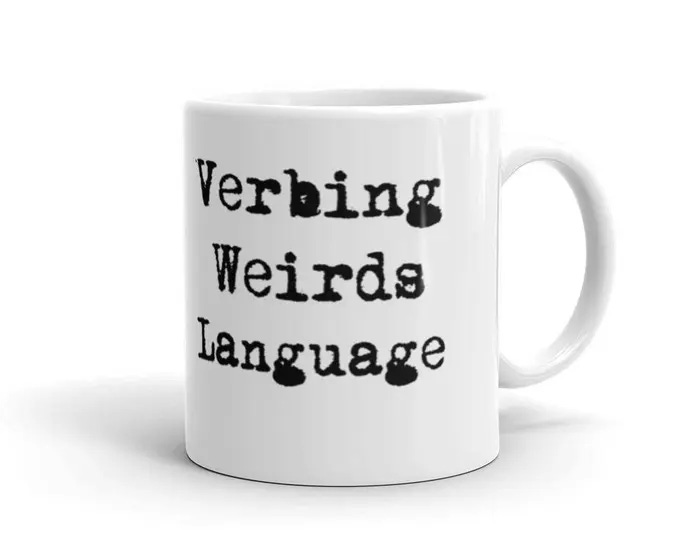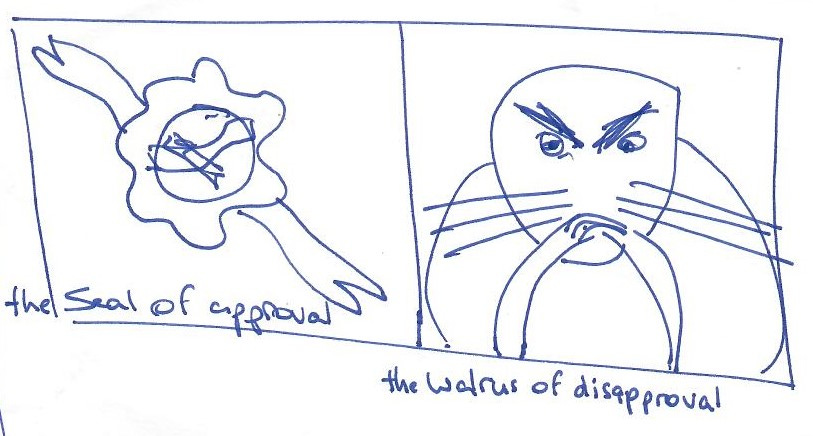Verbing
Some people hate it. They - and the mug - are wrong.
English is a language of low morals and wishy-washy standards. It has no problem stealing words from other languages when its own lexicon isn’t up to the job, then calling them “borrowed” words. Not only that, it frequently mangles those words in the process, messing up the spelling to suit its own conventions or slapping a new, ugly pronunciation upon them to ease the burden on those who find it too much of a strain to get their tongues around a foreign, er, tongue.
As for its relationship with itself, English is an unwashed, drunken ne’er-do-well on a permanent bender. Want to jam two words together to make a new one, like toothpaste, overpass or douchebag? Fill your boots, my friend, and don’t worry about which words can go together and which can’t - there are no rules! Want to go in the other direction and cut perfectly good words in half - as in totes and legit - to irritate the hell out of anyone over 30? There’s no law against that either.
Then there’s verbing, where a word that has existed previously only as a noun gets called into service as what your primary school teacher called “a doing word”.
You may have heard instances of it that get right up your nose. At sports events, commentators may talk of a winner being medalled. Therapists are often heavily into dialoguing, and Turner Classic Movies is famous for its tagline Let’s Movie.
If ever there was evidence that the language is going to the dogs, this, surely, is it.
But here’s the rub: like all the other bad behaviours that English engages in, verbing is part of what makes the language the vibrant, anarchic joy that it is. Those who rail against it - and there are many - are not merely fighting a losing battle, they’re fighting a battle that ended centuries ago with verbing the deserved victor.
Here are some examples, none of which are likely to offend anyone’s ears: dog someone, lord it over, holidaying in the sun, hoover down your dinner. Each of those italicised words began life as nouns only. Now look at them, wandering around like planets loosed from their orbit.
In fact, any noun can be verbed. In 2012, when Clint Eastwood addressed an empty chair at the Republican National Convention, Eastwooding enjoyed a short life as a word for talking to an empty chair. One of the most memorable lines in the movie The Martian is when Matt Damon’s character quips, “I’m gonna have to science the shit out of this” (which he duly does). In law, when new rules don’t apply to existing entities, the old rules are said to have been grandfathered in. (Check out this scene from the best movie ever made for more.)
I know you’re dying to know the official term for verbing - the one used by etymologists in academic papers. It’s denominalisation, which simply means transforming a noun into another kind of word. And, like so many technical terms, it’s not only a bugger to spell right with fat fingers at the keyboard, it’s also not nearly as memorable as the word the rest of us use.
Things can also work in reverse, with verbs being called into service as nouns, a process called - wait for it - nominalisation. This can be even more annoying for the annoyable than verbing. Language writer and theatre critic Henry Hitchings offers the following examples:
“Do you have a solve for this problem?”
“Let’s all focus on the build.”
“That’s the take-away from today’s seminar.”
Rather than pour scorn on this practice (which he doesn’t especially like), Hitchings looks for an understand. It gives an impression of freshness, he says. It’s jaunty and can create a sense of immediacy. And it’s concise; imagine saying “I got through the crowd by pushing people out of the way with my elbows” instead of simply “I elbowed my way through the crowd”.
I’m with him. Like anything, overdoing it can become tiresome instead of lending freshness. But the solution there is simple: don’t overdo it.
What’s more, as I bang on about when I’m leading my writing training course (and if you haven’t done it yet, what are you waiting for?), the real sin is overusing a particular type of nominalisation called a zombie noun, as in this further example from Hitchings: “The successful implementation of the scheme was a validation of the exertions involved in its conception.” In these cases, nominalisation has seen a suffix tacked onto the end of the noun (implement becomes implementation, etc).
In 1979, Eve Clark and Herbert Clark published a study called “When Nouns Surface as Verbs.” The more concrete and unambiguous the noun’s meaning, the more easily it’s accepted as a verb. After considering over 1,300 examples of denominal verbs found most come from nouns that “denote a palpable object.” That is, concrete nouns lend themselves nicely to the task.
As for the phrase “zombie noun”, it’s the invention of New Zealand academic Helen Sword, one of my favourite people for her tireless work in promoting clear and energetic writing. (Sword was actually born in the US, but she’s lived in New Zealand for over 20 years, so she belongs to us now.)
Finally, you may be wondering if there is a collective term that covers both verbing and nouning. There is, anthimeria, which comes from the Greek meaning “one part for another”.
A more common term is functional shift or functional conversion - that is, adopting one part of speech or word class in place of another. It’s an especially popular practice among advertising copywriters, who’ve coined taglines like “More Happy”, “Bring the Good”, and “Where Awesome Happens”. If I was creative director of an ad agency - if such people still exist - I’d be inclined to ban all such constructions on the basis that they’re overused, overcute and a tad lazy.
But then if I was creative director of an advertising agency, I would be on such a ridiculous salary that I wouldn’t need to supplement my meagre income by eking out a weekly newsletter on language.
And where would be the fun in that?
Ken’s cartoon of the week (the first, but not the last)
Bits and specious
When The Godfather II came out (aka The Best Movie Ever Made), it was met with a lukewarm response by many critics who felt it jumped too much between time periods and was too slow. It didn’t take long, though, for it to become widely regarded as one of the great movies.
Why are more and more Brits speaking Multicultural London English? Thanks to reader Paul Solomon for this.
Quote of the week
First they came for the verbs, and I said nothing because verbing weirds language. They they arrival for the nouns, and I speech nothing because I no verbs.
someecards



